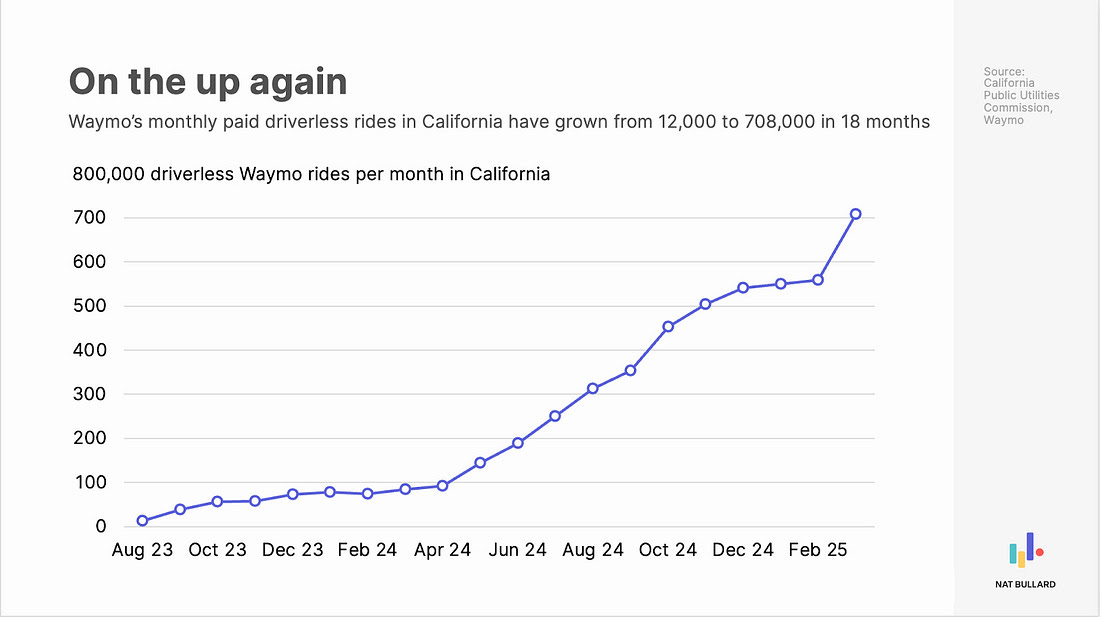
Welcome to the Ride AI newsletter: your weekly digest of news and intelligence at the intersection of technology and transportation.
The California Public Utilities Commission (CPUC) has approved Waymo’s application to expand its fully autonomous service area to include nearly all of South Bay and San Jose, right as the company celebrates 10 million paid rides.

With its newly approved operating domain, it is now theoretically possible to take a Waymo vehicle door-to-door from San Francisco to San Jose—a journey that typically takes over an hour by Caltrain.
Meanwhile, data from CPUC shows a dramatic rise in Waymo’s monthly paid driverless rides, growing from 12,000 to over 700,000 in just 18 months. As illustrated in a graph by Nat Bullard made using data from the CPUC, the trajectory looks increasingly promising for Waymo.

Digging into the CPUC data reveals some interesting insights about trip origins. In San Francisco, popular starting points include Oracle Park, Union Square, and Fisherman’s Wharf. In Los Angeles, top locations are Santa Monica, Beverly Hills, and West Hollywood.

Since the dataset only covers California service areas, we don’t get a view into Waymo’s operations in Phoenix or Austin. Still, the California numbers represent a substantial portion of Waymo’s U.S. footprint. With the Atlanta service area now live via Uber and Miami slated to launch in 2026, we’re likely to see this growth curve steepen even further.
One last piece of Waymo news this week: following its partnership announcement with GO and Nihon Kotsu, Waymo vehicles have been spotted mapping the streets of Tokyo. A few friends in Japan even shared photos of branded Waymos navigating the Shibuya area—though you’ll need to zoom way in to catch the second one.


This past Thursday, I was interviewed by the Japanese current affairs program Beat Takeshi’s TV Tackle to discuss Waymo’s expansion and performance in the U.S.
There appears to be a fair amount of understandable apprehension around the rollout of autonomous vehicles in Japan. While Waymo is arguably the most high-profile operator entering the Japanese market, it’s certainly not alone. UK-based Wayve has also begun testing on Tokyo’s streets and recently opened both a testing and development center. Additionally, domestic companies like Tier IV and Gekidan Iino have been conducting AV trials across various parts of Tokyo since last year.
Zoox, the Amazon-owned autonomous vehicle startup, is expanding its mapping operations to Atlanta. The company will begin data collection using its Toyota Highlander test vehicles before transitioning to trials with its signature, toaster-shaped, purpose-built robotaxis.
However, the announcement comes on the heels of a second voluntary software recall in as many weeks. The most recent was triggered after an electric scooter rider collided with an unoccupied Zoox vehicle. The previous incident involved a Zoox robotaxi crashing into a passenger vehicle in Las Vegas—again, unoccupied at the time. In total, 270 custom Zoox vehicles are affected by the recall notices.
While the company's transparency in reporting is commendable, I’d argue it’s time to rethink the language we use around these software updates. "Recall" carries heavy connotations from traditional auto manufacturing, often implying urgent physical defects. Applying that same term to over-the-air software patches—while maintaining regulatory rigor—risks desensitizing the public to the word "recall" when it truly matters. We need a clearer, more nuanced vocabulary for software-first mobility.
Baidu’s Apollo Go has quietly hit a major milestone: 11 million rides served through its autonomous ride-hailing service, while also beating recent earnings expectations. It’s unclear whether this number refers solely to driverless rides or includes trips with safety drivers—but either way, it’s an impressive achievement. We’re working on bringing Apollo Go onto the podcast soon to dive deeper into what that number really means and what’s next for the program.
Alright, that’s it from me… until next week!
Get all the latest news in AI x Mobility across the globe.
Continue reading more about the world of robotics, automation, and AI